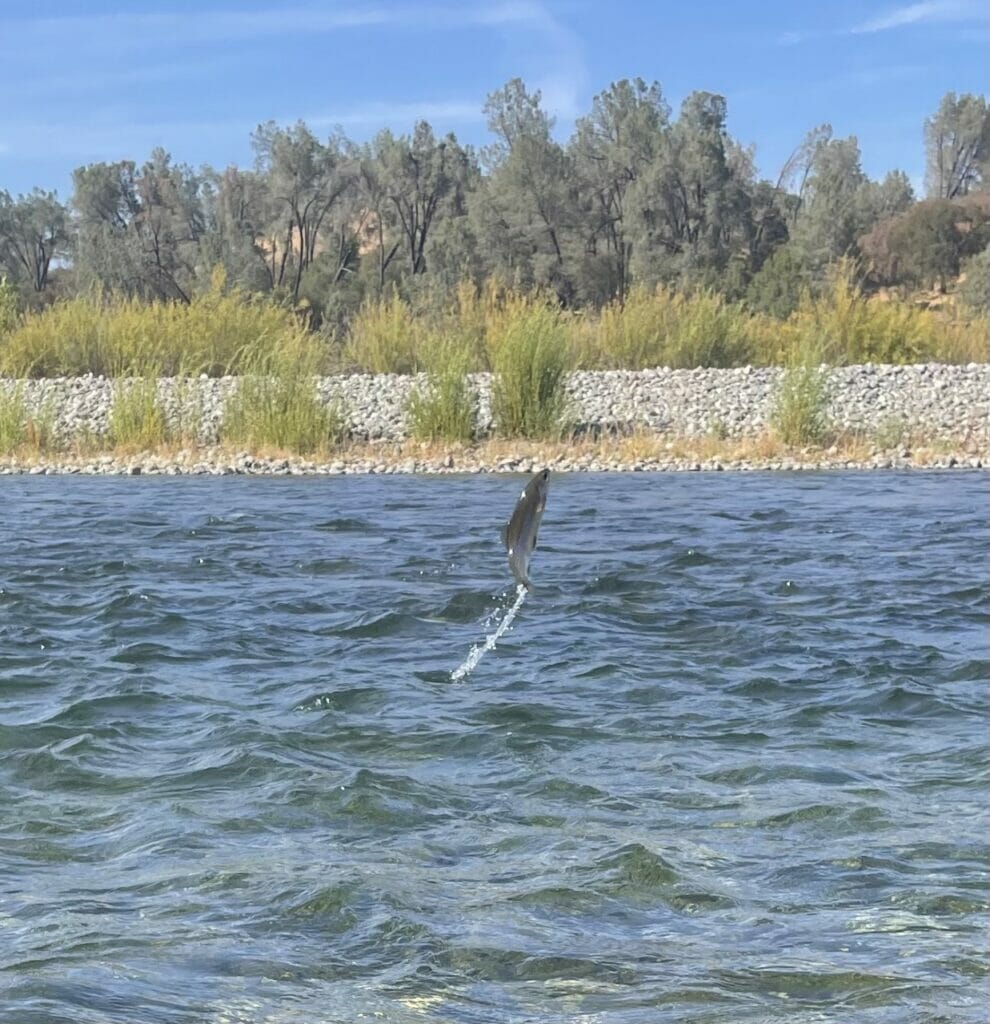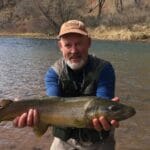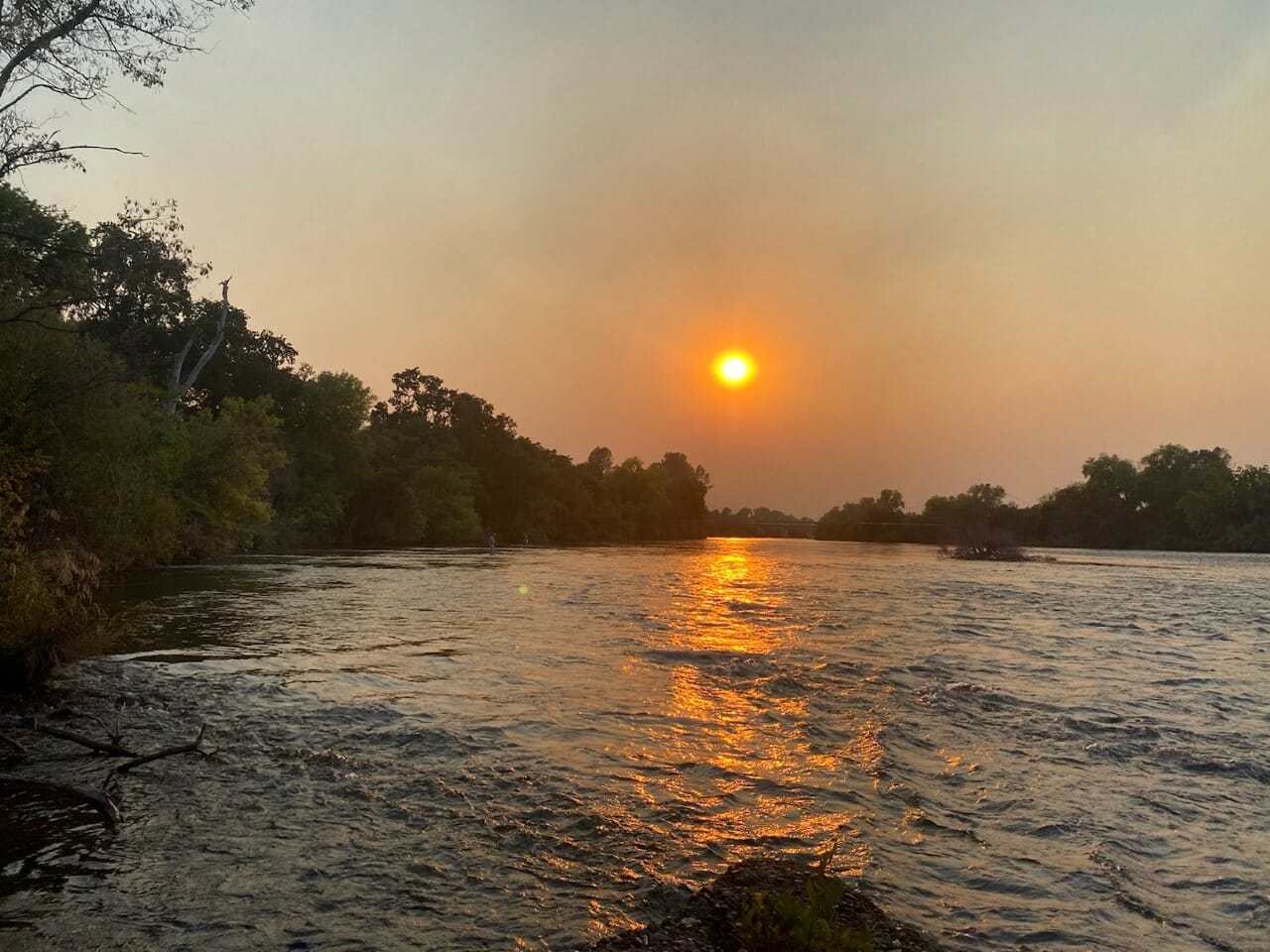For one angler, a wounded California is better than no California at all
It was a classic Yuba day with Joe and the Butler brothers—a 105-degree scorcher with the river inviting swimming as much as fishing. As typical as it seemed, the river was in many ways new to me. It had been two years since I’d visited California, and occasionally throughout the week this same feeling of novelty would strike me, how much I didn’t recognize how much the landscape had changed.
It was impossible to ignore the woods above the floodplain, oaks baked brown, grass too short, thirsty digger pines broken in half or toppled over from the roots. On the drive up, Joe had remarked that in more normal times the windshield would have been a Jackson Pollock canvas of splattered beetles and grasshoppers, and not-so-clean as to draw our attention to the scarcity of birds. Alas, the shop had recommended hoppers.
Later that week, I joined three old college friends for a COVID-postponed trip to the McCloud. Driving north from Sacramento, we passed withering nut and olive orchards through a white haze of smoke and reached Redding as the mercury hit 108. It was a distinct relief to wet wade the lower Sac, regardless of the fact that, as happens commonly on that river, a certain skunk awaited us.
Throughout the summer of drought, floods and West Coast smoke fogging up New Mexico, I’d wondered if the planet wasn’t finally horking us up like the hairballs we’d become. On my California trip, I grew sure of it. The evidence was overwhelming that our imagined place on the hierarchy of Earth’s preferred beings had been reversed: burning forests and shriveled orchards, the dirty McCloud, a persistent virus and the perverse notion that one’s religion could exempt a person from preventing others from dying.
Toward evening, a mass of cool air descended upon us. Just as quickly, a blast of heat rushed in from the west. It smelled like a campfire, seemingly embodied in the orange ball the sun had suddenly become. We bailed when our eyes began to itch and the particles started landing on us. Jamie was the last to get back to the car; we were morbidly entertained watching him buck a swirling dirt cloud driven by the fire wind. A laughing woman flew a kite in the parking lot behind him, digging in her heels as the kite strained her string.
The McCloud is a dangerous river, especially as you get older. Poison oak is everywhere, and timber rattlesnakes always appear exactly when your vigilance goes on break. The wading is always tough. I wiped out constantly, broke a rod and lodged my foot so tightly between some boulders that I could only extract it by taking off my boot. As bad as the wading is, walking along the bank through all the potholes and deadfall is often a thousand times worse.
But that’s the old normal. The new normal is that wading is even tougher and will probably stay that way until the McCloud’s next big flush. Apparently climate change and the constant drought and fire is melting Mount Shasta’s snowcap and dumping it dirty into the river. The gorgeous turquoise color is much diminished, the boulders now coated with a slick layer of rusty silt and algae.

Though certainly an accretion of everything I’d felt since my vacation began, the foreboding sparked by the murky water was a decisive blow. The leaves of poison oak should have been green and oily, not lying on the ground. Where were the hatches? In spite of gifts—say, a daybreak swarm of bats working the pool below our cabin—the periods were too long during which I could see only gloom. On my only day with Avram, thunder clouds gathering above the canyon convinced me that fires would soon be coming over the ridge and chasing us into the river.
Throughout the summer of drought, floods and West Coast smoke fogging up New Mexico, I’d wondered if the planet wasn’t finally horking us up like the hairballs we’d become. On my California trip, I grew sure of it. The evidence was overwhelming that our imagined place on the hierarchy of Earth’s preferred beings had been reversed: burning forests and shriveled orchards, the dirty McCloud, a persistent virus and the perverse notion that one’s religion could exempt a person from preventing others from dying.
California always finds a way. It birthed my sense of wonder decades ago, and seems to always restore it at the right time, aside from the basic knowledge that I am unlikely to have as much fun somewhere else. Objectively speaking, California is so absolutely beautiful to me. Sometimes all it takes is a split second.
Through years of fishing the Yuba, we’ve witnessed several occasions when the concentration of hunting dragonflies above the water gets dense enough to cause the trout to take interest. Fish continue to tip and sip if there’s a hatch coming off, but every now and then one will lock in on a dragonfly and take a shot. Even though they miss most of the time, the aerials are spectacular.
On my vacation, we had one of those dragonfly events. The fishing had been less than great up until then, so we rested in the shade as Joe scrolled through the pictures he’d shot that day. Among his pics, of willows trying to get a toehold on the opposite bank, was one accidental frame of a trout in midair.
It wasn’t just any trout but a specimen. The glint of sun off its body, the trail of spray to its tail, its calm face and the clear blue water, all of it was perfect. The fish was dead center in the frame. That the leaper was a rainbow was also perfect. In the mere attempt at catching a dragonfly, the fish expressed an optimism I could only dream to emulate.
Whenever I remembered that moment during my funk on the McCloud, the weight lifted and I would suddenly see things. The river’s own rainbows, the original stock distributed all around the world, seemed determined to reinforce their Yuba cousin’s hope. Their beauty, breathtaking as ever, reminded me that the river was wounded but not dead.
“Look at me,” they demanded. “I am your pot of gold.”
.



